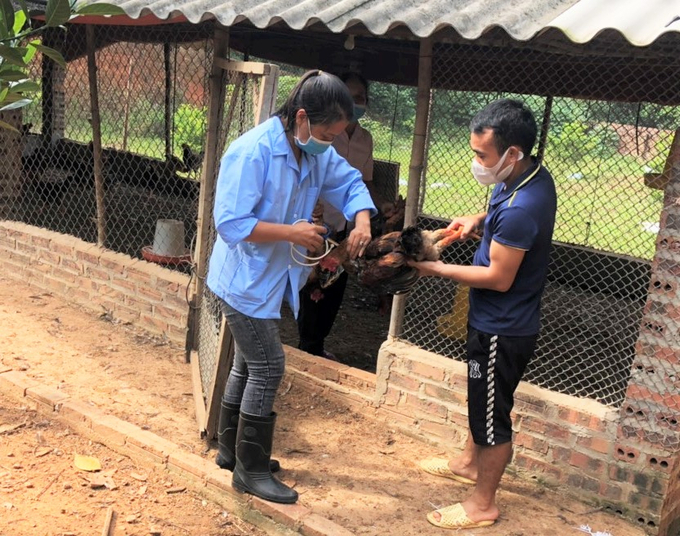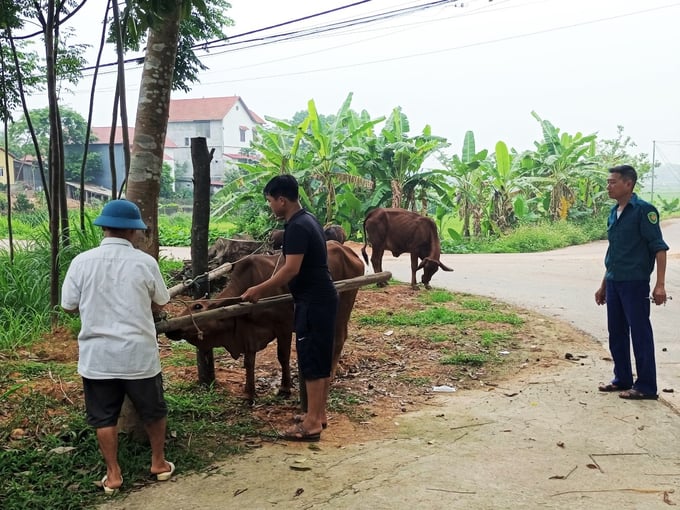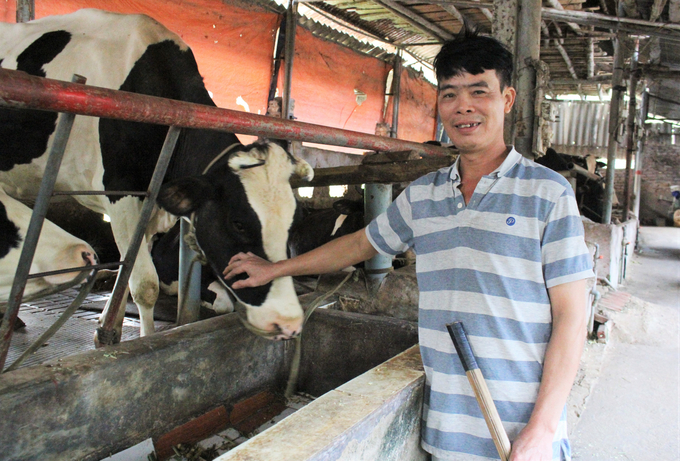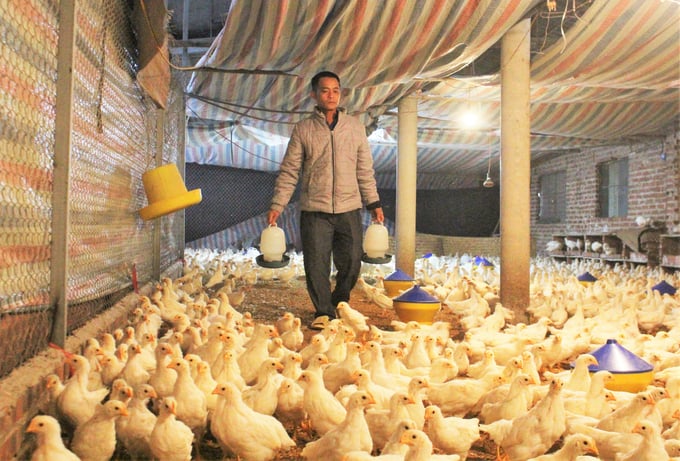Pioneer in testing African swine fever vaccine
Mr. Le Xuan Cong, Director of Vinh Phuc Sub-department of Animal Husbandry and Veterinary Medicine said: In 2022, the Provincial Sub-department of Animal Husbandry and Veterinary Medicine ordered the provincial veterinary system to the institution to regularly follow reality. , grasp the situation, focus on the performance of state administrative tasks in animal husbandry and veterinary medicine; simultaneously employ many methodical, scientific, economical and highly effective solutions.

In 2022, Vinh Phuc Animal Husbandry and Veterinary Sub-Department carried out bird flu vaccination for poultry flocks of over 7.2 million head. Picture: Trung Quan.
Where the emphasis is on information, propaganda and guidance for breeders to breed appropriately and maintain an appropriate level of rearing, particularly for poultry production; strictly implement the biological safety breeding process; guiding livestock households in the region to apply technical advances in breed, grooming, care and disease prevention processes; Use available raw materials for blending as feed to reduce input costs; Applying high technology in animal husbandry to carry out the digital transformation in medium and large livestock farms…
In addition, the sub-department directs the district’s livestock and veterinary stations to coordinate with the specialist departments of the district, township, county and township people’s committees to focus on the use of vaccination for livestock, poultry and pepper breeding environment secures the plan.
In addition, coordinate with Navetco Company for the selection of qualified swine farms for the use of vaccination and supervision of the trial of NAVET-ASFVAC African Swine Fever Vaccine (DTLCP) in the managed area.
Directs the community veterinary staff to closely monitor the epidemic situation in livestock herds in villages, hamlets and livestock households, especially in ASF, foot-and-mouth disease (FMD), avian influenza, to detect early and timely treatment. Strictly implement the process of animal and animal product quarantine, slaughter inspection, veterinary sanitation inspection to detect violations and deal with them promptly according to regulations.
Simultaneously control compliance with laws in the manufacture and trade of veterinary medicines, aquatic veterinary medicines, veterinary practice and veterinary medicine advertising in the province…

Among buffalo and cows, the Vinh Phuc Animal Husbandry and Veterinary Sub-Department has vaccinated 159,000 children against foot-and-mouth disease; Pasteurellosis 78,800 animals. Picture: CCCNTY Vinh Phuc.
In terms of quarantine, slaughter inspection, veterinary sanitation inspection, the sub-department has issued more than 9,000 animal quarantine certificates; 30 juvenile fish quarantine certificates with the number of fish that passed the quarantine of more than 1.8 million; 4 terrestrial animal disease safe facility certificates for 4 pig and chicken farms; 2 veterinary hygiene certificates for 2 companies (1 poultry breeding and hatchery and 1 veterinary examination and treatment facility)…
Disease prevention is not just based on experience
Vinh Tuong is a place where livestock farming has developed a lot in recent years, with a variety of livestock species such as cattle, dairy cows, pigs, poultry, quail…
According to Vinh Tuong District Animal Husbandry and Veterinary Station, as of October 2022, the entire district has more than 26,800 buffalo and cows (where there are more than 14,900 dairy cows); herd of more than 50,600 pigs; poultry more than 1.5 million pieces; more than 2.8 million quail. Milk production reached more than 53,300 tons at the end of November 2022.
Vinh Tuong District Animal Husbandry and Veterinary Medicine Station chief Mr. Do Duc Tinh shared, With the peculiarity that the district has a large number of townships and cities, the area is large, while the small and scattered husbandry methods still account for constitute the majority. Therefore, the prevention, control and control of animal and poultry diseases are a special concern of the district.
Station officials and community and community veterinary personnel regularly review and monitor the disease situation in livestock, poultry and aquatic products; Collect and analyze patient samples to promptly manage the outbreak and limit its spread at scale.
The station cooperates with the Animal Disease Diagnosis – Testing and Treatment Station (Provincial Subdivision of Livestock and Veterinary Medicine) to collect thousands of serum samples, mucus fluid, stool samples, blood samples, fish samples, etc. and to proactively monitor and detect pathogens and virus circulation. From there, guide farmers to take proactive measures to prevent, control and protect livestock and aquaculture production…

According to Mr. Le Van Phuong from Kim De Village in An Tuong Township (Vinh Tuong), disease prevention in animal husbandry is not good, farmers easily leave empty-handed. Picture: Trung Quan.
In addition, the station cooperates with the drug and feed management department (department of livestock and veterinary medicine), market management no. 2 of the district to monitor compliance with laws in business transactions, trade in veterinary medicinal products, aquariums, veterinary medicine, feed and veterinary practice… there will be no dangerous infectious diseases in livestock and poultry in the district in 2022. .
Mr. Le Van Phuong’s family in Kim De Village, An Tuong Township (Vinh Tuong), who raises 27 dairy cows, shared: The investment cost of dairy farming is often very high, including stables, equipment, breeding animals, feed, for example 1 Dairy cow is worth about 50 – 60 million VND while the households raise a large number of heads. Therefore, if the disease prevention and control work is not done well so that the cows get sick, the economic losses will be great, even losses.
According to Mr. Phuong, in order to effectively prevent epidemics, in addition to regular monitoring and monitoring of the development of the cow herd, to promptly detect abnormal phenomena, to draw up appropriate treatment plans, households must strictly follow the regular vaccination schedule of the Provincial Livestock and Veterinary Medicine Department provides ( 6 months vaccination).
With many new viruses and diseases emerging at present, it is not enough to rely on experience alone, but it is necessary to have a force of qualified veterinary personnel from province to district and municipality to provide vaccines to ensure safety To ensure quality, vaccination must be given at the right time and at the right dose to ensure effective disease prevention.
In addition, to minimize pathogens, environmental pollution and odors in stables and to protect the health of farmers, stables must be regularly cleaned and periodically sprayed with disinfectants. In addition, equipment and milking machines also need to be cleaned, as these items affect the quality of the milk.
“My family sells milk to the company, every day the purchasing staff take samples to check the quality. If the hygiene is not good, no matter how much milk is produced, it will be returned. On average, the family receives about 6 tons of milk per month, which is VND 72 million (excluding expenses). So if there is a problem, the milk will be sent to the landfill with only water, causing great harm,” Phuong said.

According to Mr. Ngo Van My from Noi Village in Tan Tien Township (Vinh Tuong), disease prevention in poultry is not just based on experience. Picture: Trung Quan.
Similarly, Mr. Ngo Van My, Noi Village, Tan Tien Township (Vinh Tuong), entering a new litter of laying hens with a number of 5,000 chickens, said: In previous generations, his family sold about 4,000 chickens to the eggs/day on average , with a selling price of 2,100 – 2,200 VND/fruit, the daily income is not small. Therefore, disease prevention for chicken flocks must always be a top priority.
“When the hen egg recycling cycle ends, we also sell liquidated broilers, so we need to do a good job of preventing disease to ensure a source of income. Not only that, from hatching to egg laying, one chicken currently costs about VND 140,000, if 5,000 laying hens are raised, the cost is about VND 700 million. If the hens get sick, they’re going to be empty-handed,” said Mr.
In order to effectively prevent disease in chickens, Mr. My said his family buys breeders from reputable farms that are fully vaccinated. Give regular antibiotics during rearing to prevent disease. The barn must be clean and cool in summer and warm in winter. The use of probiotics mixed with rice husks to reduce pathogens, reduce odors and dust, and help chickens reduce the risk of disease.
“To be honest I have a long seniority in raising chickens, so some common diseases can still be diagnosed, but specific questions like whether or not the breed can ensure the right F1, dangerous diseases like influenza, Newcastle … ; If there isn’t a vaccine or cure for diseases like leukemia (leukemia, or white blood in chickens) without a qualified veterinarian, I can’t help myself,” said Mr.

